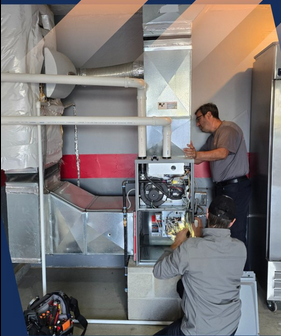Filtration and Humidity Control for Healthy Indoor Air Quality
The Truth About Indoor Air Quality: Filtration and Humidity Matter

Did you know that poor indoor air quality can significantly impact your health and comfort? As we spend up to 90% of our time indoors, understanding the importance of good filtration and humidity control is critical. In this extensive guide, we'll explore why these factors are essential for a comfortable home environment, debunk myths about 'magic UV lights', and share actionable insights to ensure you’re not just sold a bill of goods. Read on to discover how better air quality can lead to improved well-being and which strategies you can implement today!
Understanding the Basics of Indoor Air Quality
Indoor air quality (IAQ) refers to the comfort and healthfulness of the air within our homes and workplaces. It encompasses various factors such as temperature, humidity, and the presence of pollutants. With people spending so much time indoors, maintaining high IAQ standards is crucial for overall health. Poor air quality can cause immediate effects such as headaches and dizziness and long-term impacts like respiratory diseases.
The Role of Filtration in HVAC Systems
Filtration is a key component in HVAC systems, helping to clean the air circulating through our homes. High-quality air filters trap dust, pollen, pet dander, and other airborne particles. But not all filters are created equal.
1. MERV Ratings: Filters come with Minimum Efficiency Reporting Values (MERV) ratings, indicating their effectiveness at capturing particles. Higher MERV ratings mean finer filtration but can restrict airflow if not matched to the system's capacity.
2. Filter Types: Disposable fiberglass filters, pleated filters, and HEPA filters each have unique advantages. HEPA filters, for instance, can capture up to 99.97% of particles that are 0.3 microns or larger, making them ideal for allergy sufferers.
3. Changing Your Filter: Regularly replacing filters is key to maintaining air quality. Clogged filters reduce airflow and efficiency while allowing more dust and allergens to circulate.
Humidity Control: Balancing the Environment
Humidity control is just as vital as filtration for maintaining a comfortable indoor atmosphere. Proper humidity levels (ideally between 40-55%) can:
- Reduce allergens like dust mites and mold.
- Alleviate respiratory issues.
- Protect furniture and electronics from damage.
- Enhance the efficiency of your heating and cooling system.
Methods for Humidity Control:
1. Dehumidifiers: If you live in a humid region, using a dehumidifier can help maintain optimal humidity levels. Portable and whole-home dehumidifiers are available, depending on your needs.
2. Humidifiers: In dryer climates, adding moisture to the air with a humidifier can improve comfort and protect against dry skin and respiratory discomfort.
3. Ventilation: Proper ventilation enables air exchange, helping to reduce humidity levels. Consider exhaust fans in bathrooms and kitchens to move moist air outside.
Debunking the Myths about UV Lights
Marketing can sometimes blur the lines between reality and myth, especially when it comes to home comfort technologies like UV lights. You may have heard promises of miraculous air purification through “magic UV lights in a box.”
Here’s what you need to know:
- Limited Scope: While UV lights can kill certain microorganisms in the air and on surfaces, they are not a replacement for effective filtration and ventilation. Relying solely on UV for air purity may lead to neglecting essential maintenance.
- Proper Placement: For UV lights to work effectively, they must be placed in specific locations and maintained correctly. Misplacement or poor maintenance can significantly reduce their effectiveness.
- Not Supreme: UV lights should be considered an adjunct, not a primary solution for improving air quality. Don’t let attractive marketing oversell what these devices can do. Always prioritize good filtration and humidity control first.
Practical Tips for Improving Indoor Air Quality
1. Invest in a Quality HVAC System: Choosing a system that meets your home’s specific needs will greatly influence air quality.
2. Regular Maintenance: Schedule regular maintenance with a trusted HVAC professional to ensure your system operates efficiently.
3. Monitor Indoor Conditions: Use hygrometers to monitor humidity levels and air quality monitors to detect pollutants and allergens.
4. Opt for Natural Solutions: Consider houseplants that are known for helping purify the air, such as peace lilies and snake plants.
5. Education: Stay informed about your indoor air quality and make adjustments as necessary.
Conclusion: Where Do We Go From Here?
Improving indoor air quality is not just about fancy gadgets; it’s about understanding the systems that keep our homes comfortable! Invest in high-quality filtration, maintain appropriate humidity levels, and don’t be swayed by marketing myths like the quick-fix appeal of UV lights. With thoughtful action, you can transform your indoor environment into a healthier haven. Book a call for a free second opinion or a free home comfort analysis today to see how your home measures up!
Remember, a little knowledge goes a long way in creating a comfortable home that enhances your well-being. The key is to prioritize filtration and humidity, ensuring your home remains a welcoming sanctuary against seasonal discomfort. Call Unified Comfort Systems at 330-952-4822 to speak to an HVAC Expert, book an appointment, or ask questions!
Let's connect! We’re here to help.
Send us a message and we’ll be in touch.
Or give us a call today at 330-952-4822

